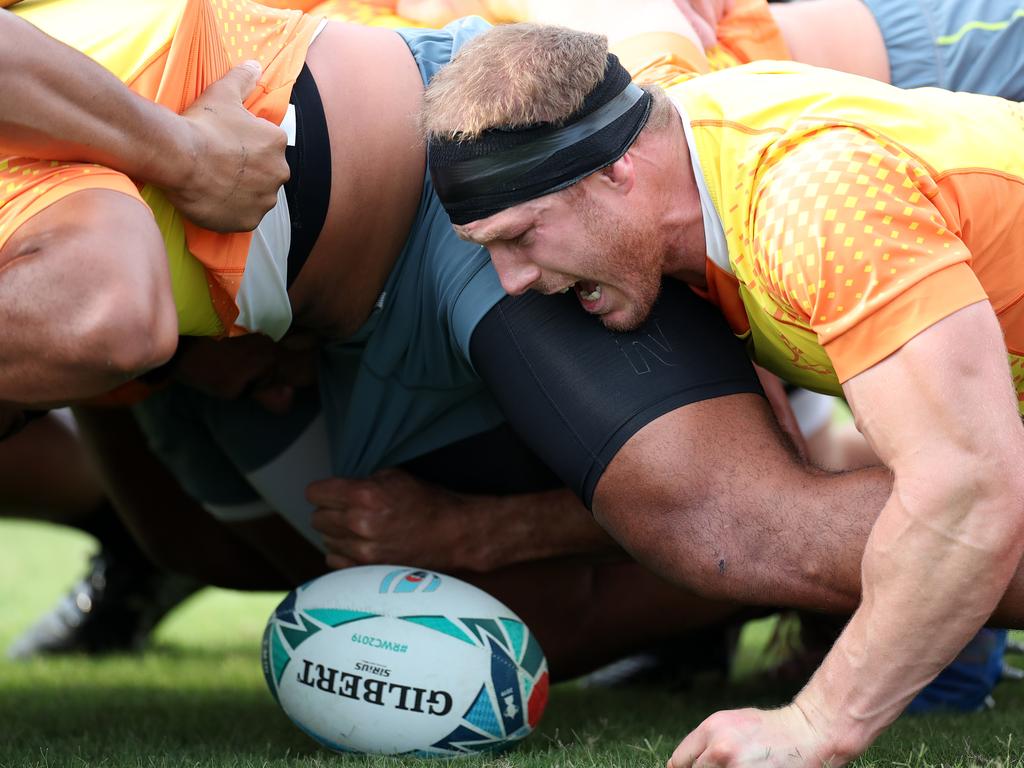Super Rugby refs on right track at breakdown, but what about Sweet Chariot?
“Less is more” should be the motto rugby authorities use to guide them through these troubled times.

Many, if not most English fans were not even aware that Sweet Chariot, the unofficial theme song of the England team, had any links with slavery. As a rugby anthem, it seemingly dates back only to 1987 when it was used as a tribute to Martin “Chariots” Offiah but the hymn — for that’s how it was originally seen — was apparently written in the mid-19th century by Wallace Willis, a black slave.
It’s as melodic as Bread of Heaven, the song sung by Welsh supporters and if you happen to be wearing a gold jersey at Twickenham or the Principality Stadium, you’ll hate them both because it almost certainly means the Wallabies are being beaten. Still, if it was left to me, I’d leave them alone and go after another Sweet C song that desperately needs to be banned from all rugby stadiums — Neil Diamond’s Sweet Caroline. Any time a prop takes the knee in the long-winded lead-up to a scrum, that’s the tune the ground announcer invariably turns to.
But back to Sweet Chariot. You would imagine that any song that started out as a hymn written by a slave would have no trouble being approved in these Black Lives Matter days but the Rugby Football Union, which controls the game in England, is nonetheless reviewing it.
One can only hope the rugby authorities in England took careful note of what Rugby Australia was put through over the Israel Folau matter and decide to leave well enough alone.
At least there were definitive battlelines where Folau was concerned. For many, he became a symbol both of freedom of speech and freedom of religion; for others, it all came down to whether he had breached his contract and deserved to be terminated. Yet it was a battle that ensnared rugby for fully two years and cost it a fortune. Even now, six months after RA paid more than $3m to make the whole matter go away, it seems every hostile anti-rugby tweet brings it to life again.
So if the RFU wants to guarantee that Sweet Chariot is sung by virtually every member of the 82,000-strong Twickenham capacity crowd, the surest method would be to ban it. By all means educate rugby people about the song’s historic context, but the minute they move to ban it they’ll make it more popular than Sweet Caroline or that other staple of sporting contests, We Will Rock You.
“Less is more” on the refereeing front would also appear to be the secret for reducing the need for time-filling tunes.
While there have been law variations coming at us from all over the place this year, the one that has resulted in the most desirable change happened without having to amend any laws at all.
All that was needed was a new interpretation of the breakdown by referees to produce the prospect of a more-flowing game when Super Rugby Aotearoa was launched last weekend. I say “prospect” rather than the actual free-flowing product because the two matches produced 60 penalties in all, 40 of them at the tackle area. But the games did look like they could have opened up quite spectacularly once the initial onslaught by match officials had run its course.
The new interpretation is designed to create a less messy breakdown and the way the games were officiated in Dunedin and Auckland last weekend should have placed everyone on notice, the ball-carrier as well as defenders. Anyone carrying the ball is allowed only one dynamic movement once their knee has hit the ground in the tackle. They are allowed to place the ball in any direction but that’s it. Anyone who attempts to steal a couple more metres by crawling or rolling along the turf — are you listening, All Blacks? — will be penalised.
Defensively, tacklers are expected to roll away immediately, ostensibly in the direction of the sideline although I assume that anyone making a genuine attempt to get out of the way while on the open side of the ruck will be cut a little slack. There were a number of side-entry penalties on the weekend but since the retirement of Richie McCaw scarcely anyone noticed.
As for the jackallers — the David Pococks of a team — the good news was that they did not have to survive multiple attempts to clean them out to win a penalty. As long as they were making a realistic attempt to strip the ball, the referees would generally reward them, and quickly. Still, there were concerns expressed by the Australian Super Rugby coaches that the easy rewards for the jackaller at the expense of the attacking side needed to be watched closely. It did, however, increase the opportunity for turnover counter-attack.
Not suggesting that the new interpretation will revolutionise rugby in the way as the “six again rule” has rugby league but the potential for a faster game is definitely there, so too a safer game now that the jackaller isn’t going to be subjected to such heat.
And while a certain Mr McCaw would probably earn most votes globally for being the best flanker of all time, it’s fair to say that Australia also have had their contenders for that title, with George Smith and Pocock right up there. The point is that the Wallabies have a tradition of producing such players and while Fraser McReight and Liam Wright have a grand total of one Test between them, it’s fair to say that this new interpretation means they are set to come right into their own any time soon.
The nagging worry is that there must have been an earlier time when referees interpreted the breakdown in this fashion but ultimately gave it up because it was too difficult to police. If they did, then they should hang their heads because the inevitable outcome was that the tackle area turned into a place where brawn alone ruled. And if rugby does become a place where only big men can survive, then they will have to rewrite the charter about it being for all shapes and sizes.
Still, it has been fascinating to watch the impact that good referees can have without the need to change the laws. Now, if they could only start pinging a few sides for time wasting at the scrum and enforce the offside law, we might just have an attractive game again.







“Less is more” should be the motto rugby authorities use to guide them through these troubled times, and that applies equally to deciding what to do about Sweet Chariot as to fixing up the breakdown.